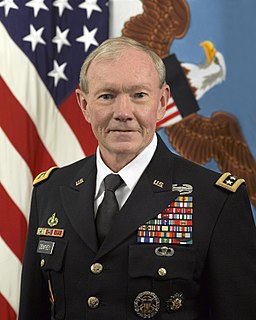Top 27 Quotes & Sayings by Martin Dempsey
Explore popular quotes and sayings by an American military man Martin Dempsey.
Last updated on April 14, 2025.
The America I know is trusted, sometimes guardedly, but among those who aspire to improve the lives of their citizens, among those who feel vulnerable, and among those who want an equal voice in a partnership, we remain the partner of choice. The America I know leads, sometimes cautiously, but always ethically.
We became consumed with preparing to go on a deployment, going on the deployment, coming back, and getting ready to go again. We stopped sending young men and women to our professional military education when they should have gone. We stopped doing things like command climate surveys. We got sloppy with contracting oversight.





















